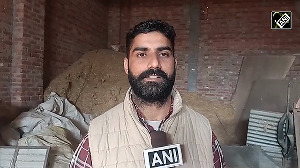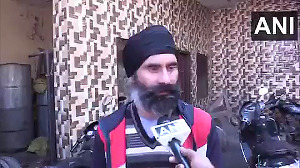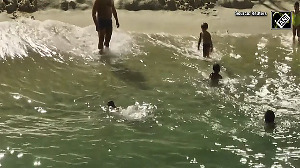Professor Haridarshan Singh Mejie (75), chairman of PCP group of companies with business interests in Iraq, has been in the news recently because of his outspoken remarks indirectly indicting former external affairs minister Natwar Singh in the Iraqi Oil-for-Food scam.
His assertion --first to rediff.com and then to several television channels -- that Natwar and his son Jagat had visited Baghdad looking for business and that Iraqi Oil Minister Aamer Rashid had told him how Natwar was favoured by the Saddam government, caused immense embarrassment for the Congress party.
Mejie also claims that Natwar Singh -- who has denied knowing him -- had dinner at his house in Baghdad along with former Maharashtra chief minister A R Antulay.
The Congress dismissed his claims as "baseless charges of a person without any locus standi in the matter" while Natwar's lobby, on the back-foot because of Mejie's remarks, dismissed him as 'loud mouth.'
Mejie, known to be a maverick, has a M.Tech from IIT, a Masters of Mechanical Engineering from University of Illinois and a Post Graduate Diploma from Roorkee University.
An engineer with more than 50 years experience in diverse fields, he started as a Lecturer in Production Engineering at Roorkee University in 1954. In 1969, he was invited by the Punjab government to head the first joint sector company, Punjab Chemi Plants Limited (PCP), as a private partner and managing director. Over the years, PCP acquired international standing and diversified into various disciplines and built a number of associate companies.
Mejie first took PCP overseas in 1976 to Kuwait, and soon moved on to Qatar, Iraq, UK and the US. He has been in Iraq since 1978 and did not pull out even when the Gulf war started. He is into marketing with various UN organizations, including the oil-for-food programme of Iraq, and became India's largest player in Baghdad.
In 1996, he began working with the UN Peacekeeping Operations.
After the telecast of his views on the Volcker report, Mejie is upset that a television channel twisted his quotes and sensationalized it by implying that Congress President Sonia Gandhi could be involved in the oil scam.
"I have never spoken against Congress President Sonia Gandhi. Not that I am afraid to speak out but I do not have any proof to involve her or the Congress party. I know what was happening in Baghdad and it is not fair to drag her in the issue without any evidence," he told rediff.com.
Although under tremendous pressure, Mejie is unwilling to retract his statements against Natwar and his visit to Baghdad with his son. Natwar was in Iraq to seek oil business and "surely, there are some evidences involving his son Jagat and his relative-friend," he said.
A strong supporter of Saddam Hussein, Mejie believes the deposed Iraqi President did not do anything wrong by selling oil to his favourites because Iraq was a sovereign nation and Hussein had the right to sell oil to the supporters of Iraq.
In an exclusive conversation with Managing Editor Sheela Bhatt, Mejie shared his deep insight into the UN Oil-for-Food programme, because of which Natwar Singh lost his portfolio on Monday.
How did the Oil for Food Program function?
There were two aspects to it. First was the sale of oil by Iraq and the second the supply of goods.
The United Nations Security Council had in July 1996 (Under Resolution No 986) allowed Iraq to sell oil under strict "contractual conditions", for the purpose of obtaining "funds for purchase of humanitarian goods". These contractual conditions broadly were:
- Oil will be sold at a price level approved by an 'International Experts Committee'.
- Oil will be sold to direct users -- refinery owners or those traders nominated by a refinery.
- The income from the sales was to be deposited in an Escrow account at the French BNP Bank, New York branch. Funds were to be utilised as per the UN Resolution. The major part being for purchase of humanitarian goods while the minor part was for transportation of the goods as well as 'after sales service'.
How did Saddam Hussein implement the programme?
The procedure for contractual sale by Iraqi government was something like this:
At the head of the chain of command was the Iraqi President. The Iraqi oil ministry would clear proposals to sell the oil to UN approved list of buyers. Once cleared, contractual vouchers would be issued to the buyers, who would pay for it into the Escrow account. They would then lift oil at the Al Bakur terminal in Turkey.
The Oil-for-Food programme was initially approved for six months but later kept on being extended by the UN. Iraq needed the vocal support of some of the countries that were close to it. So the Saddam regime used the contractual vouchers to bribe political leaders/parties to get that support. Natwar Singh is termed as 'non-contractual beneficiary'.
The documents of 'non-contractual sales were maintained by the Iraqi oil ministry. These records were not destroyed during the war but were taken away and made available to UN Security Council.
What do you think about the Volcker report, which lists many people and companies of India?
We knew that the committee was formed and that all documents recovered from Iraq's oil ministry would be available to it. We also know that the committee wrote to all people whose names were mentioned in the records. Those that responded, the committee members visited them personally.
PCP International was also mentioned in the Volcker report.
We responded and three experts of the team spent three hours with us in our Dubai office. We know that all names in the various lists of 650-page Volcker report are factual and based on the records at their disposal.
What do you think about those Natwar Singh and the Congress party who have been named in report?
We feel the committee's report is based upon facts and documents available. I stand by my belief that the UN has documented proof against everybody named in the Volcker report. The two individuals (including Natwar Singh) named are those who met me in Baghdad. They claimed to me that they were there 'to call on the President (Saddam Hussein)'.
In Iraq only Saddam authorized all oil deals. Without his nod not a barrel could move.
The orders for issue of oil vouchers for the non-contractual deals were issued only on the President's written orders.
Saddam feared for his life after the first Gulf War.
He was paranoid about security and met very few people they had to be really important for him to meet them. With regard to an Indian political party named in the report, I believe there must be something on record with the committee but I am not privy to those documents.
What do you think about allegations against so many Indian companies?
These are names of the 'supply or trading' companies from all over the world, who supplied 'humanitarian goods' to Iraq after Phase VI (the third year of the Oil-for-Food programme). In 1999, with the start of phase VII, the companies supplying material, were given some conditions:
- An Iraqi government company would transport goods from port of entry till delivery to stores. Their rates were not much more than private transportation. So all bidders accepted this and incorporated the transport cost in their offers.
- After sales service charges -- the Iraqi authorities, while issuing bids, told suppliers to provide either 'after service' or pay 10 per cent of the cost to the Iraqi government.
The transport costs and after sales service margins were all the time approved by a UN committee, which includes nominees from the United States and the United Kingdom. Many times our bid was much less than the market price.
At that time, these members were aware of these charges but approved it because of political compulsions of that time. My company's name is included in the list but Volcker's staff gave us a clean chit.
Complete Coverage: The Volcker Report






 © 2025
© 2025